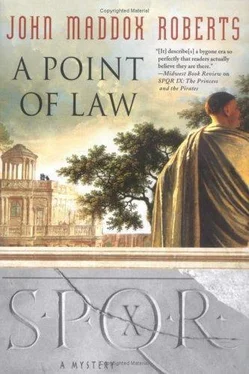John Roberts - A Point of Law
Здесь есть возможность читать онлайн «John Roberts - A Point of Law» весь текст электронной книги совершенно бесплатно (целиком полную версию без сокращений). В некоторых случаях можно слушать аудио, скачать через торрент в формате fb2 и присутствует краткое содержание. Год выпуска: 0101, ISBN: 0101, Издательство: St. Martin, Жанр: Исторический детектив, на английском языке. Описание произведения, (предисловие) а так же отзывы посетителей доступны на портале библиотеки ЛибКат.
- Название:A Point of Law
- Автор:
- Издательство:St. Martin
- Жанр:
- Год:0101
- ISBN:9780312337254
- Рейтинг книги:5 / 5. Голосов: 1
-
Избранное:Добавить в избранное
- Отзывы:
-
Ваша оценка:
- 100
- 1
- 2
- 3
- 4
- 5
A Point of Law: краткое содержание, описание и аннотация
Предлагаем к чтению аннотацию, описание, краткое содержание или предисловие (зависит от того, что написал сам автор книги «A Point of Law»). Если вы не нашли необходимую информацию о книге — напишите в комментариях, мы постараемся отыскать её.
A Point of Law — читать онлайн бесплатно полную книгу (весь текст) целиком
Ниже представлен текст книги, разбитый по страницам. Система сохранения места последней прочитанной страницы, позволяет с удобством читать онлайн бесплатно книгу «A Point of Law», без необходимости каждый раз заново искать на чём Вы остановились. Поставьте закладку, и сможете в любой момент перейти на страницу, на которой закончили чтение.
Интервал:
Закладка:
We stepped outside into the dimness. “What a gracious lady,” Julia said. “For once I can only commend your judgment in seeking out a foreign woman.”
“That’s good of you, my sweet. Hermes, who are all these men?” I could just make out the forms of some twenty or thirty men crowding the street. One held a small torch that did not yield enough light to reveal more than that. The others brought out torches and ignited them from that one. Soon I could see an abundance of military belts and high-strapped, hobnailed military boots, and men with hard limbs and harder faces, all deeply tanned.
“Evening, Senator, my lady,” said young Burrus, decurio of the Tenth Legion.
“Hermes, I can’t have this!” I protested. “These are all Caesar’s men! I won’t have people thinking I’m taking Caesar’s side against the others, that I’m-” I mumbled the last few words because Julia placed her fingers across my lips.
“Decius,” she said, “be quiet.”
“You put him up to this!” I said, astonished.
“I didn’t have to. We discussed how to keep you from getting yourself killed with this absurd neutrality, and Hermes suggested this. I concurred.”
“The time is past for neutrality,” Hermes told me, this boy who used to carry my bath implements and run my errands. “Let people say what they will. These men are here by their own choice whether you want them or not, and they will keep you safe in spite of yourself until this business is over. Remember, in the City they aren’t Caesar’s soldiers, they are citizens and voters and they can do as they like.”
I sighed, knowing defeat when it was staring me in the face. I was as much in Caesar’s camp now as if I had been in his army in Gaul.
“Let’s go home,” I said.
13
We left my house in the pearly light of earliest dawn. When I stepped from my gate onto the street, it was already packed with my supporters. The occasion was too serious and solemn for a cheer, but I heard a collective murmur of approbation from them.
As soon as I was in the street, I was surrounded by soldiers. This we had discussed the night before, and as much as I hated to look like I went in fear of my fellow citizens, I could not reasonably object to this precaution. There was a very real possibility that the Marcelli, or Octavia, might decide to spare themselves embarrassment by hiring someone to slip a dagger between my ribs before I could reach the trial site.
Hermes accompanied me, positioned to my left rear, the most likely approach for a right-handed assailant. Before me stretched a wedge of soldiers. At the tip of the wedge were young Lucius Burrus and his father. Old Burrus had chosen to wear his military decorations, of which he had earned a cartload: silver bracelets, torques, phalerae , even a civic crown. Armed soldiers could not enter the City, but I had the toughest-looking pack of unarmed soldiers south of the Padus. Stretching far behind was a great mob of my clients, my neighbors, and other supporters.
“Well,” I said, “barring rooftop archers, I should make it to the Forum alive.”
“Archers,” muttered a nearby soldier. “I knew we should’ve brought shields.”
“Let’s be off,” I said.
The mass of humanity began its stately pace down the narrow street, toward the Clivus Suburanus, which would take us to the Forum. Julia and the household staff would follow as soon as the street was halfway cleared.
I wore my best toga, not my Candida . It might look presumptuous, to show up at a trial wearing a chalked-up toga. Besides, proper rhetorical form called for a lot of broad gesticulation, and that could raise great clouds of chalk dust, an undignified sight. I was impeccably barbered and had spent the previous hour in breathing exercises, practicing my gestures, and gargling hot, vinegared water, things I hadn’t done in years. For once I wasn’t carrying weapons. It might be awkward if my dagger or caestus should clatter to the podium at the peak of a dramatic gesture. Instead, Hermes carried them for me.
When we reached the Forum, the crowd was already gathering. The trial was to be held in the old Forum’s largest open space, at the western end between the Basilica Aemilia and the Basilica Sempronia. There the magistrate’s platform, recently restored and adorned by Caesar, stood ready for a trial before the comitia tributa . This meant that, instead of the center of the platform being dominated by a praetor in his curule chair, we would be facing the Tribunes of the People, who by custom would be seated on a single bench. Since none of the presiding officials held imperium, there were no lictors on the podium. Behind the platform, on the Basilica Aemilia side, towered the wooden bleachers erected for the three hundred equites who would be my jury.
The Metelli were already gathering by the western end of the podium: my father, Creticus, Nepos, and Metellus Scipio, accompanied by their huge rabble of supporters, along with many friends and colleagues, some of them personally devoted to the Metelli, others merely opposed to the same people. Cato was there, and I welcomed his support as heartily as I disliked him personally.
To the other side, I saw a great pack forming, many of them old Clodians hoping to witness my downfall, some of them the men I had seen with Marcus Fulvius. I was curious to see whether any of the Marcelli would make an appearance among them, but I saw none of them. Perhaps it was too early. Or perhaps they were having second thoughts about the whole affair.
Father looked disgusted when I walked up, surrounded by my entourage.
“Did you have to show up like an invading army?” he spat.
“No choice. They’ve appointed themselves my bodyguard.” I scanned the bleachers, where the jury, wearing their narrow-striped tunics, were only beginning to take their places. The podium was as yet deserted. “Is there someplace where we can discuss this business before the proceedings begin?”
“It’s a little late for discussion,” Father said, “but if you’ve anything to tell us, just have your little army give us some space.”
So the soldiers formed a ring around us and held the crowd back. Scipio gave me a quick rundown of the day’s procedure.
“Cato will lead off. He’s not a member of the family and is known to oppose us on many policies, so he’ll be respected as an impartial speaker. He’ll challenge the constitutionality of this court so we’ll have groundwork laid for a retrial if you should be convicted. That will mean you can’t stand for election tomorrow, but there will be other years. Then he’ll laud your good character and defame the late Marcus Fulvius. Then he’ll introduce the speakers, all of them prominent men, who will shout what a wonderful person you are.
“It will then be the other side’s turn to bring on the accusations against you.”
“Who is to prosecute?” I asked.
“Manilius himself,” said Creticus.
“What? A serving tribune? Is that legal?” This I had not anticipated.
“Apparently there is no law that specifically forbids such a thing,” Cato told me. “Tribunes are usually too busy for such activities, but this is Manilius’s last day in office, and the exposure will benefit his campaign for the aedileship.”
“What did you want to tell us?” Father said. “Time is short.”
So I began a precise description of my findings. Before I was halfway through, their fallen faces told me that this was not going down well. Father cut me off with a short, savage gesture.
“Cease this nonsense! A secret code? A Greek mathematician, and a woman at that? Are you mad?”
“A conspiracy among three of the most prominent men of the state?” Scipio cried, going scarlet. “One of them a sitting consul! Another almost certain to be elected consul for next year?”
Читать дальшеИнтервал:
Закладка:
Похожие книги на «A Point of Law»
Представляем Вашему вниманию похожие книги на «A Point of Law» списком для выбора. Мы отобрали схожую по названию и смыслу литературу в надежде предоставить читателям больше вариантов отыскать новые, интересные, ещё непрочитанные произведения.
Обсуждение, отзывы о книге «A Point of Law» и просто собственные мнения читателей. Оставьте ваши комментарии, напишите, что Вы думаете о произведении, его смысле или главных героях. Укажите что конкретно понравилось, а что нет, и почему Вы так считаете.









